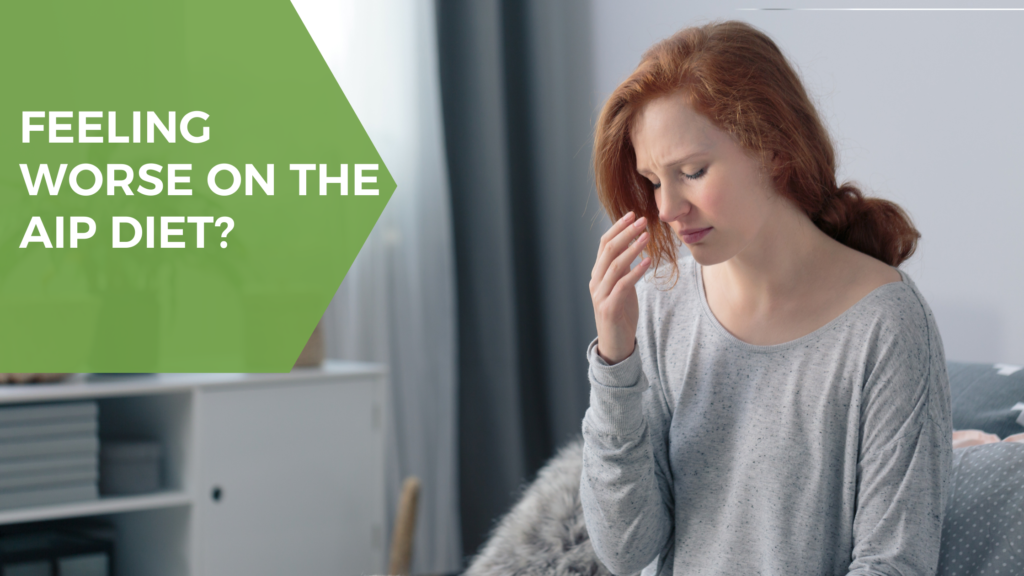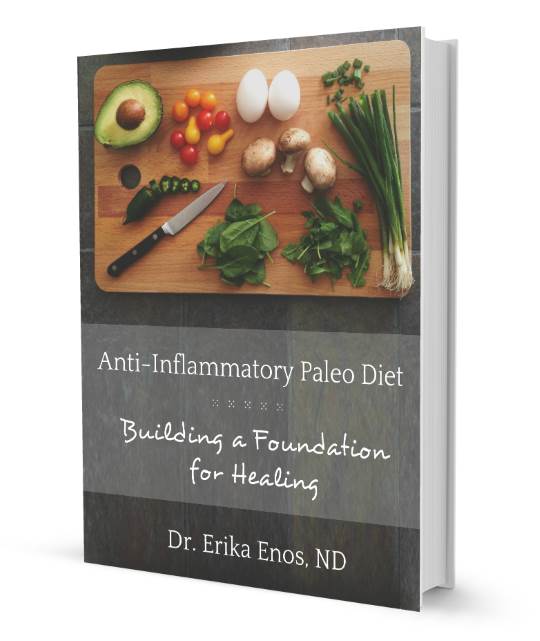
An Anti-Inflammatory Paleo (or Auto-Immune Paleo) diet is a staple therapeutic diet I use often in my practice in the first phases of treating a variety of chronic conditions. Time and time again I have seen patients achieve results that could be considered miraculous on this plan (check out this post for more info). AIP removes foods that are inflammatory for everyone, processed foods that have been stripped of their nutrients, and helps to suss out many of the main food sensitivities and intolerances that contribute to chronic disease. When these foods are removed, by default the diet becomes richer in healing foods. But not everyone improves on an AIP diet and some people might even feel worse! This may feel defeating after you’ve put a lot of effort into changing the foods you are eating. However, your response to the diet, good or bad, likely has a simple explanation and may even be helpful in understanding more of the nuances of where your body is at right now. Let’s discuss some of the common reasons why you may have no or a poor response to an AIP diet.
“I felt worse on AIP!” If this is true for you, it could be because of the following:
You are going through a normal adjustment period.
- During the first week of drastically changing your diet you may feel worse for a short period of time. This could be because you’ve removed addicting foods from your diet. Processed foods are often designed to be addicting so you eat and buy more of them. Gluten containing grains are an example of an addicting food – in some individuals gluten can actually stimulate opiate receptors by being broken down into opiate peptides called gluteomorphins!
- You may be struggling as you’ve cut down on or eliminated caffeine. Ween yourself slowly and don’t forget that green tea, matcha and yerba mate are totally AIP compliant.
- On AIP, you are likely eating fewer simple carbohydrates and quick sugars in favor of slower burning complex natural carbohydrates, proteins and fats. Your body will need to adjust to this positive change in fuel source. You may feel a little hungrier or less energetic during this adjustment.
- I would say that this difficult adjustment period happens for less than 20% of my patients but it does happen. It is often over in a few days but can last over a week.
You aren’t eating enough or you are going too low carb.
- When you change your diet, it pays to plan ahead. Have plenty of leftovers on hand and easy snacks ready to go. If you don’t, you’ll either fall off the plan or go hungry. For most of us, hunger leads to “hangry” and low energy. Thus, you feel worse. An AIP isn’t by default a low carbohydrate diet but it can feel that way depending on what type of foods you are used to eating and how you are balancing your plate. I remember a patient on AIP talking about how irritable she was getting in the afternoons. I asked her to describe a typical meal for me: beef and broccoli. This is definitely AIP compliant and a good choice, but unless you are drenching the broccoli in a healthy fat, like extra virgin olive oil or butter, this is likely to lead to low blood sugar and a dip in energy pretty quickly. Even if you are including lots of healthy fat, if you are used to consuming fast burning carbs at most meals this combo might leave you not feeling great in the beginning. A low carb diet works well for many people, but some people feel better with more healthy carbohydrates due to their particular metabolism or activity level. A good starting rule of thumb is to eat a serving of a starchy vegetable or fruit with each meal. Here are some starting guidelines for the remainder of your plate: fill half your plate with low to moderate carbohydrate vegetables, eat a palm sized portion of protein and don’t be shy with the healthy fats.
You are bloated on AIP.
There are three main reasons I see bloating happen on AIP: Histamine Intolerance, SIBO, and inadequate stomach acid production
- Histamine is the substance that your body produces in response to bug bites and environmental allergens. Histamine isn’t produced only in our skin and respiratory passages, it can be made in your gut by bacteria and it can be consumed in food. Some gut bacteria break down histamine and others produce extra histamine. If you are already having issues with high histamine levels, some common practice on AIP might worsen your symptoms. These include eating fermented foods and eating precooked (batch cooked) foods. Fermented foods, including pickles, sauerkraut, all types of yogurt and kombucha, are very high in histamine. We often encourage fermented foods on AIP to help repair the gut and decrease inflammation but if you get bloated when you increase these, it is likely a sign that you either started consuming too much too quickly or you have a histamine intolerance. For convenience, batch cooking is usually encouraged on AIP. This means cooked foods might sit in the fridge for multiple days. Leftovers naturally increase in histamine levels. For most people, this isn’t an issue at all but if you don’t break down histamine well due to genetics, gut bacteria balance or poor detox, leftovers may make you feel worse.
- If you go from a diet filled with processed foods with very little fiber, like bread and dairy, you may feel bloated from eating all the veggies that are consumed on AIP. This could be a normal adjustment period but it could also mean that you have SIBO (Small Intestinal Bacterial Overgrowth). In SIBO, normal gut bacteria is too abundant in your small intestine. Although you have commensal bacteria all over your gut, from your mouth to your anus, the majority should be concentrated in your colon where it will ferment fiber. Fiber that is fermented by colon bacteria usually results in positive health outcomes. When bacteria is too plentiful in your small intestine and they start processing fiber there, you will often have intense bloating.
- If you feel bloated after a meal or you feel like food is sitting too heavily in your stomach, you may be low in stomach acid. Although stomach acid is usually thought of as a bad thing that needs to be reduced, it is actually incredibly important for accessing nutrients from your food and proper gut function. Stomach acid is the first chemical step in breaking down protein. It is especially important for breaking down animal protein. If you come to an AIP diet from a vegetarian diet, your body may have down regulated production of HCl (stomach acid). Stomach acid can be too low from stress, lack of minerals like zinc, and eating on the go. Stomach acid also decreases with age (my thoughts are that this has to do with a lifetime of eating nutrient poor foods and poor food hygiene as much as aging itself (learn more here). If mineral deficiencies and eating habits are corrected, your body should start producing more stomach acid on its own in response to the dietary changes. However, in the meantime, you may want to use herbal bitters or apple cider vinegar before meals or take a quality digestive enzyme with HCL at the start of your meal.
You are constipated on AIP.
Constipation could come as a result of any of the above causes of bloating. You might also be decreasing irritating foods that were masking an underlying tendency towards constipation- irritation from foods can cause a fast transit time or loose stools making you feel regular when that regularity is really from irritation. You may not be eating enough high-fiber veggies to make up for removing the fiber found in beans and whole grains. But if you increase fiber and it makes things worse, consider SIBO. Alternatively, you may not be eating enough good fats – a common but often overlooked cause of constipation! Your morning bowel movements may have been falsely stimulated by all the coffee you were drinking and now that coffee is out or you aren’t drinking any caffeine at all (AIP removes coffee but green tea is allowed), you aren’t as regular. Try fresh lemon juice in warm water first thing in the morning and increase bitter-tasting veggies to help stimulate your bowels in lieu of caffeine.
You’ve started the diet but you’ve done so kicking and screaming OR you’re depressed by the diet because “you love food.”
Attitude goes a very long way with dietary changes. I recommend you go into any dietary changes with a positive, healing attitude of CHOICE. No one is forcing you into any particular diet. I and other practitioners might highly recommend a certain diet, but you always have a choice. Remember that AIP is a therapeutic diet. This means you aren’t meant to stay on a strict AIP forever but it is used as a tool in the short run while your body is healing. This doesn’t necessarily mean that once your body is healed you can go back to a SAD (Standard American Diet) but it usually means that you can eat a range of whole, natural foods with flexibility for some processed and less ideal foods.
Occasionally I will have a new patient that tells me they don’t care about food at all and so diet changes won’t be a problem (they don’t “love food”). I ache for these people! What an awful existence to not care at all about something that you do every day that has a tremendous capacity to heal but also to bring pleasure. One of the interesting things about returning to a whole natural diet is that you appreciate foods in a new and different way. You will naturally let go of food addictions and many cravings. Your tastes will be reawakened to real foods when you’ve let go of the drama of high sugar, high fat, and added flavorings. You might just end up taking more pleasure in your food.
Dive into an AIP diet with excitement. Read blogs with recipes but don’t forget to look through actual cookbooks too. For me, bound recipes with beautiful photographs help me to feel more excited about discovering and cooking new recipes than reading a computer screen. From my perspective, a true foodie will find plenty to eat on an AIP when they focus on what they can eat vs what they cannot.
There are bigger issues creating symptoms in your body that need to be focused on first.
This doesn’t necessarily mean these need to be resolved before you make ANY dietary changes but you may have some healing to do before fully adopting AIP or before you fully realize the benefits of AIP and begin to feel amazing. Above, I mentioned histamine intolerance and SIBO as conditions that may need to be treated before you can feel the benefit of a therapeutic diet like AIP. Chronic infections, mold toxicity, and environmental toxins are just examples of other issues that you might need to take care of before you change your diet or concurrently so that you can feel the full impact.
Conclusion
I know it can be a little overwhelming when you first start out on the autoimmune protocol. AIP is not just about what you cut out; it’s also about adding in healing foods that nourish your gut and give your immune system the rest it needs to recover from years of damage caused by inflammation. If you’re feeling worse while going through this transition period, don’t worry–that’s normal, explainable, and usually temporary! It will get better with patience, proper healing, and a great attitude. If you have further questions or need support on your AIP journey, please contact our office to set up an appointment.
